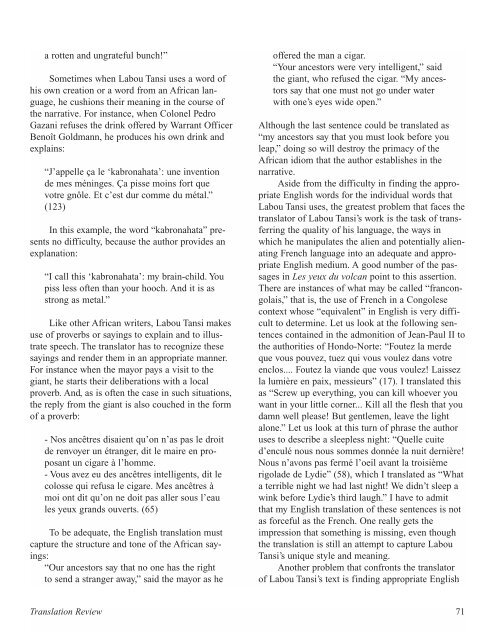Translation Review - The University of Texas at Dallas
Translation Review - The University of Texas at Dallas
Translation Review - The University of Texas at Dallas
Create successful ePaper yourself
Turn your PDF publications into a flip-book with our unique Google optimized e-Paper software.
a rotten and ungr<strong>at</strong>eful bunch!”<br />
Sometimes when Labou Tansi uses a word <strong>of</strong><br />
his own cre<strong>at</strong>ion or a word from an African language,<br />
he cushions their meaning in the course <strong>of</strong><br />
the narr<strong>at</strong>ive. For instance, when Colonel Pedro<br />
Gazani refuses the drink <strong>of</strong>fered by Warrant Officer<br />
Benoît Goldmann, he produces his own drink and<br />
explains:<br />
“J’appelle ça le ‘kabronah<strong>at</strong>a’: une invention<br />
de mes méninges. Ça pisse moins fort que<br />
votre gnôle. Et c’est dur comme du métal.”<br />
(123)<br />
In this example, the word “kabronah<strong>at</strong>a” presents<br />
no difficulty, because the author provides an<br />
explan<strong>at</strong>ion:<br />
“I call this ‘kabronah<strong>at</strong>a’: my brain-child. You<br />
piss less <strong>of</strong>ten than your hooch. And it is as<br />
strong as metal.”<br />
Like other African writers, Labou Tansi makes<br />
use <strong>of</strong> proverbs or sayings to explain and to illustr<strong>at</strong>e<br />
speech. <strong>The</strong> transl<strong>at</strong>or has to recognize these<br />
sayings and render them in an appropri<strong>at</strong>e manner.<br />
For instance when the mayor pays a visit to the<br />
giant, he starts their deliber<strong>at</strong>ions with a local<br />
proverb. And, as is <strong>of</strong>ten the case in such situ<strong>at</strong>ions,<br />
the reply from the giant is also couched in the form<br />
<strong>of</strong> a proverb:<br />
- Nos ancêtres disaient qu’on n’as pas le droit<br />
de renvoyer un étranger, dit le maire en proposant<br />
un cigare à l’homme.<br />
- Vous avez eu des ancêtres intelligents, dit le<br />
colosse qui refusa le cigare. Mes ancêtres à<br />
moi ont dit qu’on ne doit pas aller sous l’eau<br />
les yeux grands ouverts. (65)<br />
To be adequ<strong>at</strong>e, the English transl<strong>at</strong>ion must<br />
capture the structure and tone <strong>of</strong> the African sayings:<br />
“Our ancestors say th<strong>at</strong> no one has the right<br />
to send a stranger away,” said the mayor as he<br />
<strong>of</strong>fered the man a cigar.<br />
“Your ancestors were very intelligent,” said<br />
the giant, who refused the cigar. “My ancestors<br />
say th<strong>at</strong> one must not go under w<strong>at</strong>er<br />
with one’s eyes wide open.”<br />
Although the last sentence could be transl<strong>at</strong>ed as<br />
“my ancestors say th<strong>at</strong> you must look before you<br />
leap,” doing so will destroy the primacy <strong>of</strong> the<br />
African idiom th<strong>at</strong> the author establishes in the<br />
narr<strong>at</strong>ive.<br />
Aside from the difficulty in finding the appropri<strong>at</strong>e<br />
English words for the individual words th<strong>at</strong><br />
Labou Tansi uses, the gre<strong>at</strong>est problem th<strong>at</strong> faces the<br />
transl<strong>at</strong>or <strong>of</strong> Labou Tansi’s work is the task <strong>of</strong> transferring<br />
the quality <strong>of</strong> his language, the ways in<br />
which he manipul<strong>at</strong>es the alien and potentially alien<strong>at</strong>ing<br />
French language into an adequ<strong>at</strong>e and appropri<strong>at</strong>e<br />
English medium. A good number <strong>of</strong> the passages<br />
in Les yeux du volcan point to this assertion.<br />
<strong>The</strong>re are instances <strong>of</strong> wh<strong>at</strong> may be called “francongolais,”<br />
th<strong>at</strong> is, the use <strong>of</strong> French in a Congolese<br />
context whose “equivalent” in English is very difficult<br />
to determine. Let us look <strong>at</strong> the following sentences<br />
contained in the admonition <strong>of</strong> Jean-Paul II to<br />
the authorities <strong>of</strong> Hondo-Norte: “Foutez la merde<br />
que vous pouvez, tuez qui vous voulez dans votre<br />
enclos.... Foutez la viande que vous voulez! Laissez<br />
la lumière en paix, messieurs” (17). I transl<strong>at</strong>ed this<br />
as “Screw up everything, you can kill whoever you<br />
want in your little corner... Kill all the flesh th<strong>at</strong> you<br />
damn well please! But gentlemen, leave the light<br />
alone.” Let us look <strong>at</strong> this turn <strong>of</strong> phrase the author<br />
uses to describe a sleepless night: “Quelle cuite<br />
d’enculé nous nous sommes donnée la nuit dernière!<br />
Nous n’avons pas fermé l’oeil avant la troisième<br />
rigolade de Lydie” (58), which I transl<strong>at</strong>ed as “Wh<strong>at</strong><br />
a terrible night we had last night! We didn’t sleep a<br />
wink before Lydie’s third laugh.” I have to admit<br />
th<strong>at</strong> my English transl<strong>at</strong>ion <strong>of</strong> these sentences is not<br />
as forceful as the French. One really gets the<br />
impression th<strong>at</strong> something is missing, even though<br />
the transl<strong>at</strong>ion is still an <strong>at</strong>tempt to capture Labou<br />
Tansi’s unique style and meaning.<br />
Another problem th<strong>at</strong> confronts the transl<strong>at</strong>or<br />
<strong>of</strong> Labou Tansi’s text is finding appropri<strong>at</strong>e English<br />
<strong>Transl<strong>at</strong>ion</strong> <strong>Review</strong> 71

















